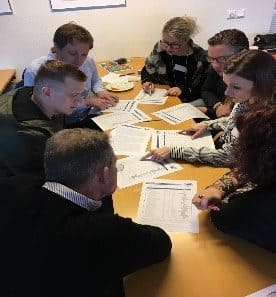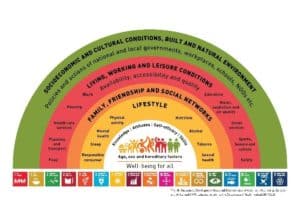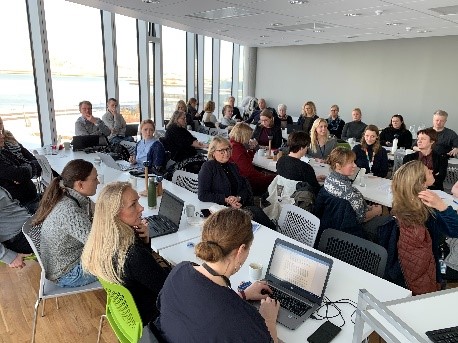Many of the factors that affect our health lie beyond the scope of the health sector. Therefore health systems have an important role in influencing other sectors to protect and promote health. This is the rationale behind Iceland’s ‘Health Promoting Community Programme’ (HPC), which has been rolled out in most municipalities. Getting other sectors to engage can be a challenge. But recent initiatives to align the HPC with efforts to meet the country’s commitment to the UN Sustainable Development Goals (SDGs) have strengthened its standing and potential impact.
By Gígja Gunnarsdóttir and Ingrid Stegeman
The HPC program is run by the Directorate of Health in Iceland (DOHI) in collaboration and consultation with local authorities and other stakeholders. It is embedded in national policy documents like the Public health policy (2016-2030). The DOHI currently has signed agreements with 34 local governments, covering 93.5% of the Icelandic population.
Local steering groups
Each of these municipalities has employed an HPC coordinator in a full or part-time capacity. Much of the coordinator’s work focuses on bringing together and managing a local steering group of representatives of different municipal departments, including primary health care. Stakeholders like representatives from schools, older people’s organisations, and sports clubs are directly or indirectly involved.

The steering groups discuss health trends in the municipality. These trends are based on data which is published annually. It covers major lifestyle determinants, health status, well-being, and health care services. Their work is also guided by checklists developed by the DOHI. They focus on key determinants of health, like mental health promotion, nutrition, physical activity, safety, violence and injustice, tobacco and other narcotics as well as wider determinants like the housing and employment levels. Steering group members can rate their performance in relation to criteria included in the checklists, on a scale from 1-5. The outcomes simultaneously reflect what issues in the municipality need most attention, and what can be done to improve them.
How does an HPC municipality work?
Each participating HPC municipality has its own secure work area within the web-based platform (www.heilsueflandi.is) to complete the checklists, and obtain further guidance. All municipalities participate voluntarily and are free to choose what issues to work on, based on the needs identified and their resources. The coordinators can also interact with each other and receive guidance and training on how to engage with other sectors to address the specific challenges that they face.
While the approach is welcome, it is nevertheless demanding. For example, it takes time and resources to work with other sectors to convince them that it is also in their – and not just the health sector’s – interest to act in ways that benefit the community’s health and well-being. But the effort is worth it.
A cross-sectoral approach

Some sectors may not recognise health promotion as their responsibility. However, most if not all are conscious of their need to contribute to the SDGs. Since these goals relate to many of the social determinants of health and achieving them can be a pathway to better health, DOHI recognised the potential of aligning the HCP objectives with the SDGs. They advised the Prime Minister’s office on approaches to achieve the Goals. This also captured the office’s interest in the HPC Programme. This turn attracted the interest of other high-level actors, elevating the status of the HPC.
Multi-stakeholder HPC steering group
The DOHI capitalised on this and established a formal multi-stakeholder HPC steering group in autumn 2018 at national level. This should raise awareness about the links between the social determinants of health. The aim is to encourage greater buy-in, more quality, and coordinated action amongst stakeholders, including delivery on the SDGs. The steering group is comprised of representatives from the Directorate of Health (including the Director of Health), the Prime Minister’s Office, the Ministries of Health, Social Affairs and Education and Culture, as well as the Association of Local Authorities and the Development Centre of the Primary health care. The group meets up to four times a year, with regular communication between meetings. They discuss data and indicators, criteria for the HPC web-based platform and how sectors can better align their work to achieve the overall objective of enhancing well-being across Iceland.
National multi-sectoral Consultation Platform
DOHI has also established a national level multi-sectoral Consultation Platform for HPC and the SDGs. This will provide input on the development of the tools and to support local HPC coordinators and bodies. It brings together representatives from different Directorates, as well as e.g., the National Planning Agency, the Icelandic Transport Authority, the Office of Ombudsman for Children and the Icelandic Food and Veterinary Authority. This group also meets up to four times per year and collaborates regularly between meetings; the focus to date has also been to develop criteria for the web-based platform.

The HPC criteria’s and relevant SDG´s are being linked via HPC web-based platform, currently being finalised. Municipalities can thus digitally monitor their progress. This is not just in relation to public health, but also towards the achievement of the Sustainable Development Goals. Efforts are ongoing to improve the HPC work. For example, identifying and applying the best data available, and further support to the local coordinators and steering groups are part of that. As a part of that journey, DOHI is also in the process of becoming the national network for WHO Healthy Cities in Iceland.
For more information on the HPC Programme in Iceland, please contact: Gígja Gunnarsdóttir, [email protected]
Read more also about the HPC programme and the SDG´s in Icelands Voluntary National Review report 2019 (page 35-36)


